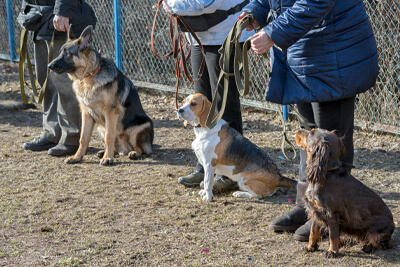
So, what is the difference between a dog trainer and a dog behaviourist? Before answering this question, let's look at what trainers and behaviourists actually do.
The Role of Dog Trainers
Providing an important service, dog trainers can help teach your dog to be a perfect companion. Some trainers teach basic manners and actions like, for instance, 'Sit', Stay' or 'Come'; 'Walk nicely' on a leash, 'Lie down', and so on. Others teach pets how not to do something, like, for example, jumping up on people, lounging on beds or sofas or diving into dustbins.
Then, of course, there are more specialist trainers who provide advanced training including, for instance, protection/guard training; scent work, totally off-leash commands and search & rescue or guide dog training.
Due to these differences, it is important to make sure you - and any potential trainer you may enlist - know exactly what it is you expect and want your dog to learn.

The Role of Dog Behaviourists
Dog behaviourists typically deal with dogs that display disruptive, destructive or unusually aggressive behaviour. Often due to stress, emotional problems and/or lack of human interaction/socialisation (both of which in turn can cause both stress and emotional problems), such behaviours may include excessive chewing and/or barking, growling, biting or showing of teeth; lack of or excessive appetite and lethargy, for example.
A dog behaviourist will begin by assessing what is causing your dog to behave in a certain way. Having determined the cause of the problem, he/she will then devise a plan - of which you will invariably be an integral part - to help your dog.
A dog constantly chewing on furniture, shoes or indeed anything else he/she can get his/her teeth into while you are out may, for example, be suffering from separation anxiety. In this case, the behaviourists will help your dog realise that no matter how long you are gone, you will always come back to him/her. He/she will also show you ways to minimise this anxiety. This may include ways to get your dog used to being alone, keeping him 'busy' while you are out, etc.
If a dog can be approached only by his/her owner and acts fearfully or aggressively when others approach him/her, on th other hand, may have been socialised inadequately of suffered from lack of human interaction when just a pup. Here, the behaviourist will focus his/her efforts on socialising this dog/showing you how to get your pet used to other people.
It should perhaps be noted here that chewing can also be a sign of an underlying medical condition, as can many other behavioural issues. A dog suffering from gastrointestinal issues may, for instance, chew to combat nausea, while a dog in pain due to an injury or medical condition may refuse to eat or become overly aggressive. Ruling out such issues by seeking advice from a veterinarian is therefore vital.
Having explored what a dog trainer and a dog behaviourist do, the difference between a dog trainer and a dog behaviourist becomes clear and simple: a dog trainer teaches, while a dog behaviourist explains the behaviour of dogs and provides the means to improve this behaviour to make your dog an easier to live with, better behaved friend.
With more than 20 years' experience as specialists in dog behaviour and dog training, we are fully aware of the fact that every owner/pet relationship is totally unique - as is each and every individual pet's problem. We therefore approach each case individually, assess the situation from a unique, specific perspective and then devise the most suitable plan for you and your dog to return to a happy, harmonious life together.
To learn more about our services and/or arrange for an appointment, please do not hesitate to call us on 07776761289 now.
Dog Trainer Thailand
2/4 Moo7 Soi 63 Chaoafa Road Chalong Phuket 83130dogtrainerthailand.com © 2023